Millions' protest in youth-led global climate strike
Four million people filled city streets around the world in what was expected to be the biggest ever protest
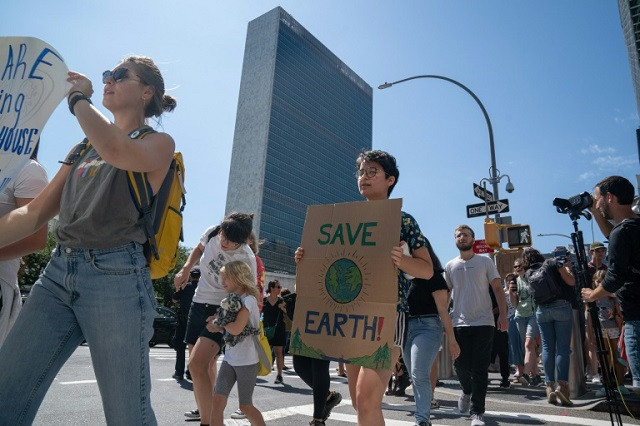
Climate activist protest near the UN headquarters on August 30 in New York. PHOTO: AFP
Some four million people filled city streets around the world, organisers said, in what was expected to be the biggest ever protest against the threat posed to the planet by rising temperatures.
Youngsters and adults chanted slogans and waved placards in demonstrations that started in Asia and the Pacific, spread across Africa, Europe and Latin America, before culminating in the United States where Thunberg rallied.
'Day Zero' looms in Australian Outback as climate change bites
"I hope this will be another social tipping point that we show how many people are engaged, how many people are putting pressure on leaders," the 16-year-old said in New York, where she claimed 250,000 protested.
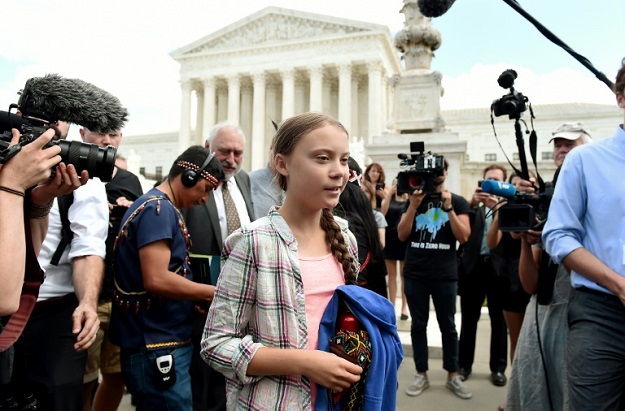 Swedish teen Greta Thunberg has become the poster child for a new youth-led climate change protest movement. PHOTO: AFP
Swedish teen Greta Thunberg has become the poster child for a new youth-led climate change protest movement. PHOTO: AFPAlthough there was no official turnout, organisers 350.org wrote on Twitter that four million people participated worldwide. The group says Friday's rallies were the start of 5,800 protests across 163 countries over the next week.
"If we actually try to make a difference we can. It's not too late yet," said 12-year-old Annabelle Abramowitz in New York, where 1.1 million students were permitted to skip school for the event.
From Berlin to Boston, Kampala to London, Seoul to Sao Paulo, protesters brandished signs with slogans including "There is no planet B" and "Make The Earth Great Again."
In Slovakia, five-year-old Teo asked a crowd of 500 "not to cut down forests, and reduce garbage production, and not to use so many petrol-fuelled cars."
Thunberg called on leaders to act now to curb gas emissions.
"Now we have proven what we can do, now they have to prove what they can (do). They need to take their responsibility," said the Swede.
German Chancellor Angela Merkel used Friday to pledge at least 100 billion euros by 2030 to tackle emissions in the energy and industrial sectors, boost zero tailpipe emission electric vehicles, and get passengers out of planes and onto trains.
Events began in the deluge-threatened Pacific Islands of Vanuatu, the Solomons and Kiribati, where children chanted: "We are not sinking, we are fighting."
The defiance message was heard across the globe as children closed their textbooks in a collective call to action.
"We are the future and we deserve better," 12-year-old Lilly Satidtanasarn, known as "Thailand's Greta" for her campaign against plastic bags in malls said in Bangkok.
In India, schoolchildren rallied in New Delhi and Mumbai while thousands protested in the Philippines, which experts say faces threats from rising sea levels and increasingly violent storms.
About 200 marched in Ghana's capital Accra, where some 44 per cent of the country's population has not heard of climate change, according to a study by Afrobarometer.
"Developing countries like Ghana are the most affected. We don't have the resources to adapt to climate change," said 26-year-old protest organizer Ellen Lindsey Awuku.
Several thousand protested in Brazil, where banners slammed President Jair Bolsonaro over recent devastating fires in the Amazon rainforest.
In Mexico City, protesters wore wrestling masks and skeleton costumes associated with the country's Day of the Dead celebrations.
Organisers said more than 300,000 children, parents and supporters rallied in Australia alone.
Australia has been struck in recent years by droughts, more intense bushfires, devastating floods and the blanching of the Great Barrier Reef -- phenomena experts have blamed on a changing climate.
The protests also highlighted resistance from climate change sceptics.
"The facts are, there is no link between climate change and drought, polar bears are increasing in number," said Australian ruling coalition parliamentarian Craig Kelly Thursday.
Businesses also backed the protests.
Amazon chief Jeff Bezos pledged Thursday to make the US retail giant carbon neutral by 2040 and encouraged other firms to do likewise.
Ahead of climate summit, UN chief demands 'positive' news
Friday's mass action kicked off several high-profile climate events in New York.
A Youth Climate Summit will take place at the United Nations on Saturday.
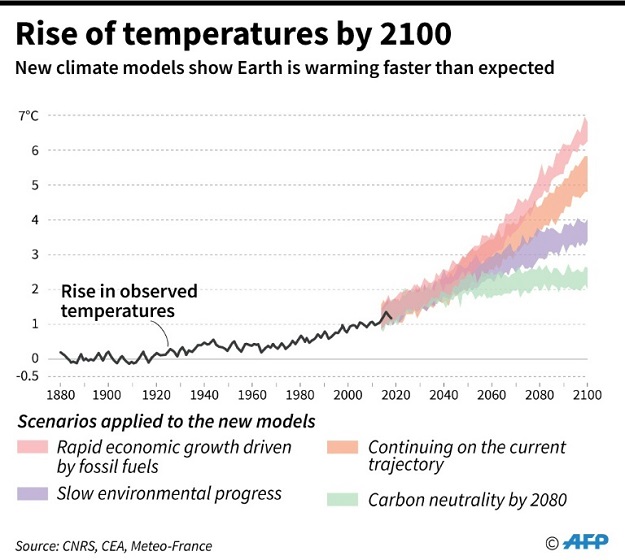 Rise of temperatures by 2100. PHOTO: AFP
Rise of temperatures by 2100. PHOTO: AFPUN Secretary-General Antonio Guterres will host an emergency summit on Monday in which he will urge world leaders to raise their commitments made in the 2015 Paris climate accord.
The agreement saw countries pledge to limit the long-term rise in the average temperature of the Earth to two degrees Celsius (3.6 degrees Fahrenheit) over pre-industrial levels, and if possible, to 1.5 degrees Celsius.
A landmark UN report to be unveiled next week will warn that global warming and pollution are ravaging Earth's oceans and icy regions in ways that could unleash misery on a global scale.


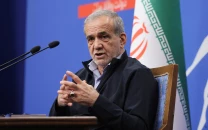
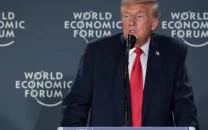


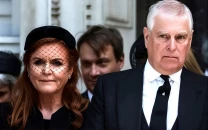












COMMENTS
Comments are moderated and generally will be posted if they are on-topic and not abusive.
For more information, please see our Comments FAQ